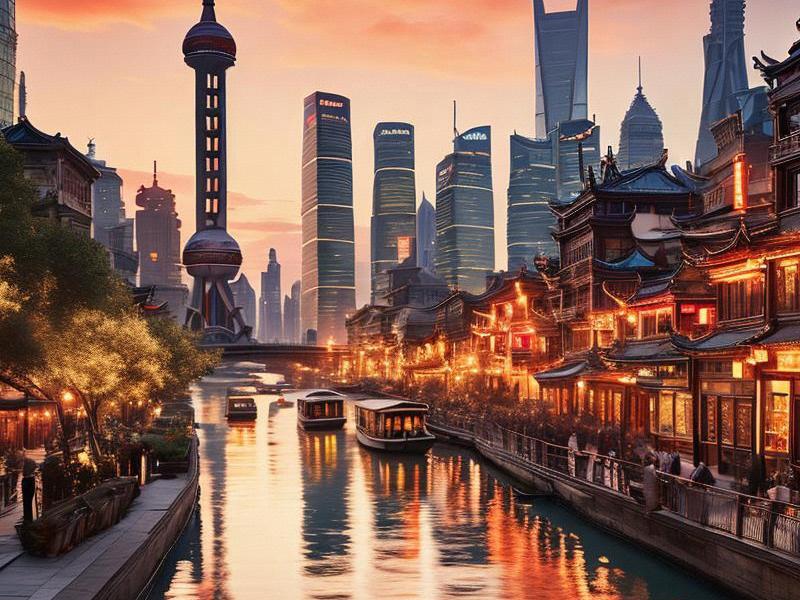
Nestled along the eastern coast of China, Shanghai stands as a beacon of progress and a testament to the country's remarkable transformation over the past few decades. This vibrant metropolis, with its skyline punctuated by the iconic Oriental Pearl Tower and the futuristic Shanghai Tower, is not just a city; it's a living, breathing symbol of China's rise on the global stage.
The city's history is a fascinating narrative of transformation. Once a small fishing village, Shanghai's strategic location at the mouth of the Yangtze River turned it into a major port by the 19th century. The concessions established by foreign powers during that era left an indelible mark on the city's architecture, evident in areas like the French Concession and the Bund, where colonial-era buildings stand shoulder to shoulder with modern skyscrapers.
Culturally, Shanghai is a melting pot. The city is a hub for art, fashion, and cuisine. The Shanghai Museum, with its impressive collection of Chinese art, attracts millions of visitors each year. The city's art scene is thriving, with galleries and contemporary art spaces springing up across the city. Shanghai Fashion Week is another major event that draws international attention, showcasing the latest trends and designs.
The culinary scene in Shanghai is equally diverse. From the famous Xiaolongbao (soup dumplings) to the savory Shengjianbao (pan-fried dumplings), the city offers a gastronomic experience that reflects its rich cultural heritage. Street food vendors in places like Nanxiang Mantou Dian (Nanxiang Steamed Bun Shop) provide a taste of authentic local flavors.
爱上海最新论坛 Economically, Shanghai is a powerhouse. As one of China's four municipalities directly under the central government, it enjoys a high degree of autonomy and plays a crucial role in the country's economy. The city is home to the Shanghai Stock Exchange, one of the largest in the world, and is a major center for finance, trade, and logistics. The Pudong area, once a rural landscape, has been transformed into a futuristic financial district, housing the headquarters of many multinational corporations.
Innovation is at the heart of Shanghai's urban development. The city has invested heavily in infrastructure, transportation, and technology. The Maglev train, which connects Pudong International Airport to the city center in just minutes, is a marvel of modern engineering. The city's metro system, one of the most extensive in the world, provides efficient and convenient transportation for millions of residents and visitors.
Shanghai's commitment to sustainability is also noteworthy. The city has set ambitious goals to reduce carbon emissions and promote green development. Initiatives like the construction of the world's first commercial-grade floating photovoltaic power plant on the Dianshan Lake demonstrate the city's dedication to renewable energy.
The city's skyline is a testament to its architectural innovation. The Shanghai Tower, the tallest building in China and the second-tallest in the world, features a unique twisting design that sets it apart from other skyscrapers. The Jumeirah Himalayas Hotel, with its stunning vertical garden, is another example of sustainable architecture in the city.
爱上海同城对对碰交友论坛 Shanghai's cultural festivals and events add to its vibrancy. The Shanghai International Film Festival is one of the most prestigious film festivals in Asia, attracting filmmakers and audiences from around the world. The Dragon Boat Festival, celebrated with dragon boat races and the making of zongzi (sticky rice dumplings), is a vibrant display of traditional Chinese culture.
The city's education system is also a key factor in its success. Shanghai's schools consistently rank among the best in the world, producing a highly skilled workforce that drives the city's economic growth. Universities like Fudan University and Tongji University are renowned for their academic excellence and research contributions.
Shanghai's international presence is growing. The city has established sister city relationships with numerous global cities, fostering cultural exchanges and economic cooperation. The Expo 2010, which attracted millions of visitors, showcased Shanghai's ability to host large-scale international events and highlighted the city's commitment to global connectivity.
上海龙凤sh419 However, the rapid development of Shanghai has not been without challenges. The city faces issues related to urbanization, such as housing shortages and traffic congestion. Efforts are being made to address these challenges through smart city initiatives and sustainable urban planning.
The people of Shanghai are as dynamic as the city itself. The cosmopolitan nature of the city has created a diverse population, with residents from all over China and the world. This diversity is reflected in the city's language, cuisine, and cultural practices. Mandarin and Shanghainese are commonly spoken, and the city's neighborhoods offer a rich tapestry of culinary experiences.
Shanghai's future looks promising. The city continues to invest in innovation, sustainability, and infrastructure, positioning itself as a leader in global urban development. As Shanghai moves forward, it remains a symbol of China's aspirations and a model for other cities around the world.
In conclusion, Shanghai is a city that embodies the spirit of China's transformation. Its rich cultural heritage, rapid economic growth, and commitment to innovation make it a unique and fascinating place. Whether you're exploring its historic neighborhoods, enjoying its culinary delights, or marveling at its futuristic architecture, Shanghai offers an unforgettable experience that captures the essence of modern China.
The city's ability to blend tradition with modernity, to innovate while preserving its cultural identity, is a testament to the resilience and adaptability of its people. Shanghai is not just a city; it's a living, evolving entity that continues to captivate the world with its charm and dynamism.
